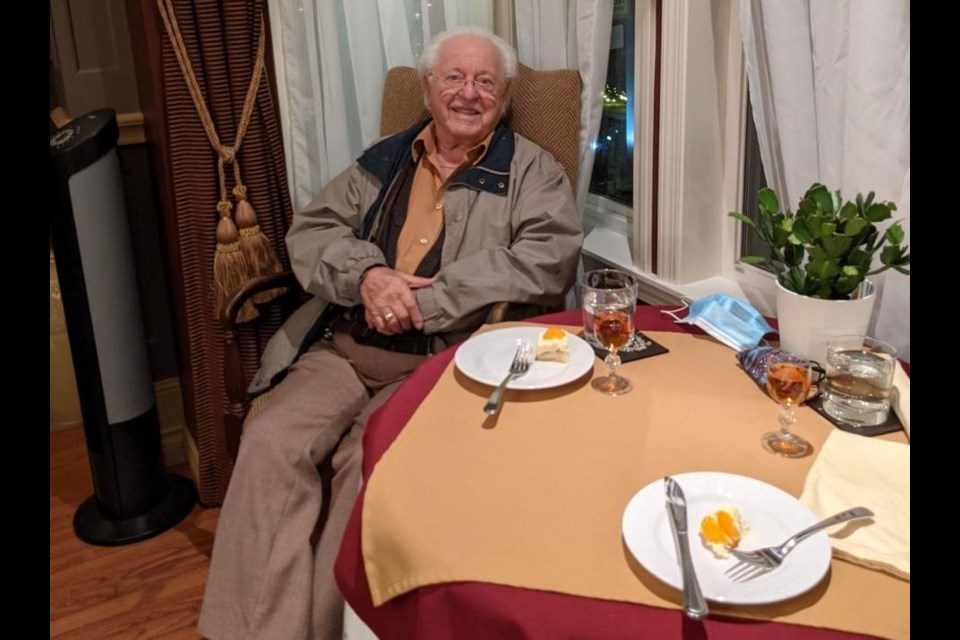Island Heath has been told to cancel all second-dose clinics this week, turning some into first-dose clinics, as part of an updated immunization strategy by the province to delay second doses of COVID-19 vaccine for four months. It’s a move that has some residents elated and others worried.
“To be honest, I’m so damn grateful I haven’t had time to research the information Bonnie Henry is claiming,” said Victoria’s Brenda Brophy whose mother was vaccinated on Monday as part of a clinic at the University of Victoria that is completing vaccinations for people in Phase 1 and starting on people in Phase 2.
On Sunday night Brophy got a call that she could get her 100-year-old mother, Dot Finnerty, into a clinic for her first shot on Monday.
Finnerty was in a seniors home prior to Christmas when her daughter, Brophy, brought her home to live with her family because she couldn’t get essential visitor status. Now Finnerty gets home support services instead and is among a group being vaccinated between now and March 15.
“I feel like getting more vaccinated sooner, including young people like my kids, is a good thing so maybe it’s the best option,” Brophy said of the four-month wait for a second dose.
Brophy said the revised plan means her mother would get a second shot in July allowing the family to spend the latter part of the summer together. That’s an idea she relishes.
Caroline Nestor said her father Joseph Nestor, 95, a resident in Independent Living in The Peninsula retirement residence in Sidney, has been told that under the new vaccination rollout he’ll be vaccinated before March 15. A second-dose clinic that was scheduled at the home for March 5 was postponed to May.
Nestor has complained that her father “slipped through the cracks” when two nurses came to The Peninsula in January and vaccinated 30 assisted living residents in a building of 67 people. Independent living residents such as her father went unvaccinated. “It doesn’t make common sense,” she said.
Joseph Nestor said in a phone interview that he touches the same button in the elevator and dines with people who are vaccinated so he’s disappointed to not have had his shot earlier but is grateful to get it soon.
Thiru Saravana-Bawan of Victoria said when provincial health officer Dr. Bonnie Henry delayed second doses to 42 days, versus the manufacturer’s recommended 21 days to 28 days, he was prepared to go along.
News this week that second doses will be given after four months “is quite a leap” he said. Saravana-Bawan said he feels like a “lab rat” and his wife was “actually crying” when she heard the announcement Monday.
“I have been a taxpaying resident of B.C. for the last 40 years; why am I being subjected without my permission to such an experiment, said Saravana-Bawan, 71, an environmental engineer who worked in occupational health and safety.
“I’m a captive audience drafted in whether I like it or not unless I say I don’t want it,” said Saravana-Bawan. “I want the vaccine, but I want it done properly.” He would prefer to buy the vaccine and have it administered as suggested by the manufacturers.
Peg Orcherton, 65, a former Greater Victoria school trustee, said she and her husband Steve Orcherton, a former NDP MLA, 69, are also concerned about the delayed second dose.
“The government is saying because, not for scientific reasons, but to get as many people with some kind of dose in their arm, they’re going to stretch that performance, and we don’t know what that means, it’s like an experiment on us in real time,” said Orcherton, who questions how much of the plan is political because the vaccine shortage has made the province’s rollout look unsatisfactory.
She said her trust in the vaccine rollout has been undermined because of her family's experience. Her 86-year-old mother and 88-year-old father live independently in James Bay. Her mother, however, has dementia and has been assessed and is awaiting placement in long-term care. That puts her mom in the first phase of people who should have been vaccinated, but that hasn't happened.
B.C. Health Minister Adrian Dix said 751 people waiting for long-term care — generally these people are in acute-care hospitals — have been vaccinated.
“Today is March 2, 2021, and my mother has not had even one dose of vaccine,” Orcherton said



